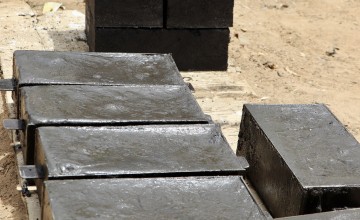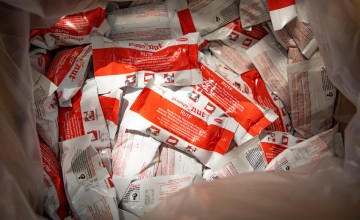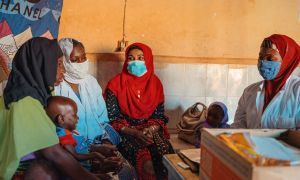
Read our 2024 annual report

Knowledge Hub
Turning Therapeutic Food Packets into Building Solutions
In three health districts in the province of Lake Chad, Concern Worldwide has been implementing the HAYAT- meaning 'life' in the local language, an integrated nutrition-health-protection programme. In partnership with International Rescue Committee (IRC) and funded by the European Union’s Directorate-General for Humanitarian Aid (DG ECHO), this 24-month, €8.5 million initiative (June 2023 to June 2025) focuses on strengthening access to and the quality of essential services for vulnerable populations in Baga Sola, Bol, and Liwa.
Specifically, it aims to improve acute malnutrition prevention and treatment, reinforce primary and secondary healthcare, reduce protection risks, support survivors of gender-based violence, and foster sustainable behaviour change among the targeted communities. In addition to its core activities, the project includes environmental protection measures, features a Crisis Modifier mechanism to respond to emergencies (such as epidemics, pandemics, floods, or displacement), and underscores the importance of inter-sectoral coordination to ensure the long-term sustainability of humanitarian efforts in the region.
At the end of 2024, a national SMART survey revealed that global malnutrition in Lake Chad province had reached 10%, with 2.5% severe acute malnutrition (SAM). Previously 15.7% Global acute malnutrition (GAM) and 2.7% with SAM. 2023
Malnourished children are treated with Ready-to-Use Therapeutic food (RUTF) and/or Plumpy'Nut, an essential therapeutic food for treating children with SAM without complications.
SAM children are identified at both community level and at health centres and are supported by Concern. RUTF supplies are provided by UNICE, however Concern maintains a contingency supplies to prevent and avoid stock-outs from UNICEF.
However, their plastic-aluminium packaging is a serious environmental issue, as the sachets are often thrown on the ground, creating pollution and posing a health problem. To address this issue, Concern contracted Karö Entreprise, a Chadian company specialising in the recycling of plastic waste.
The aim of this innovative recycling initiative was to:
• Reduce pollution caused by the presence of nutritional inputs in the environment.
• Prevent the uncontrolled resale or exchange of RUTF (Ready-to-Use Supplementary Food), by making access to new rations conditional on the systematic return of empty sachets.
• Support Karö Entreprise by strengthening its production capacity through the marketing of recycled products, the improvement of its processing and protection equipment, and the development of its personnel
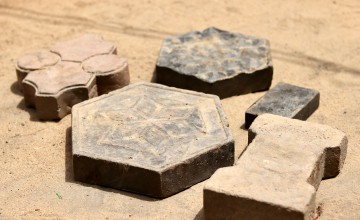
Recycling Process
The recycling of these baby food pouches is particularly complex due to their aluminium and laminated plastic composition. This specificity makes the process more demanding than conventional plastic recycling.
Karö Entreprise uses complementary pyrolysis technology to separate and dilute the thin layer of aluminium while ensuring good compatibility with other types of plastic. Thanks to this innovation, waste that was once considered unusable can now be sustainably recovered.
- Step 1: waste collection and sorting
The first step is to collect used packaging from health centres and mobile clinics. Awareness-raising campaigns are being conducted to encourage families to systematically bring back their empty packaging. The packaging collected is then handed over to the company in N'Djamena. Between December 2024 and January 2025, 59 kg of sachets have been collected, and 600 ecological cartons produced. Although this is a pilot initiative, we do not have a specific target in terms of quantity however over the coming months, more sachets will continue to be delivered.
To prevent any risk of contamination, the bags are washed in lukewarm water with a mild detergent, which removes food and grease residues.
Strict sorting then makes it possible to remove any incompatible plastic and optimally prepare for the recycling phase.
- Step 2: melting
Once cleaned and sorted, the bags are crushed into 5 to 10 mm fragments. This operation promotes melting, by reducing the presence of air bubbles and accelerating the heating time. The plastic chips obtained in this way can then be mixed and heated uniformly, improving the energy efficiency of the transformation.
- Step 3: high temperature melting
The fragments are then placed in an oven heated to between 160°C and 180°C, where they melt completely. The aluminium layer gradually thins, while other compatible types of plastic are added,
according to a precise distribution (approximately 75% sand; 25% plastic (of which 75% plastic film, 12.5% HDPE and 12.5% PET), to improve the quality of the final product.
Once this mixture is homogeneous, it is placed in moulds and pressed to ensure uniform thickness.
After cooling, the resulting pieces (paving stones or bricks) are particularly strong and can be used for construction or various types of development work.
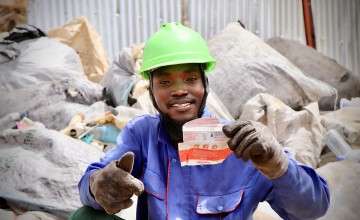
Lessons Learned
In the current pilot project, the Karö company keeps the bricks produced to use them for commercial purposes and to further develop its business (500 CFA/brick). However, in future initiatives and prospects, the idea is to use the bricks to build small structures in the Concern offices (guardians' sentry boxes, for example).
- Communication with beneficiaries, health personnel, and programme participants requires significant time to ensure systematic return of empty sachets. It is essential to start these awareness-raising activities as early as possible.
- Purchasing “multi-use” (non-plastic) bags facilitated the storage and transportation of empty sachets from health centers, thereby reducing reliance on single-use packaging and improving overall logistics.
- The involvement of district- and provincial-level health authorities is crucial for the success and sustainability of the initiative. Institutional support strengthens the adoption of good practices within the health system.
- Ideally, identifying a recycling or transformation solution within the intervention area promotes greater ownership by the community and local health system. In this project, the distance between the intervention zone and the recycling site in N’Djamena hindered participation and reduced the volume of collected sachets.
- Providing a monthly award (financial or symbolic) to the health center or mobile clinic that collects the most sachets could stimulate participation and introduce healthy competition. This approach may significantly increase the quantity of sachets retrieved and recycled.
